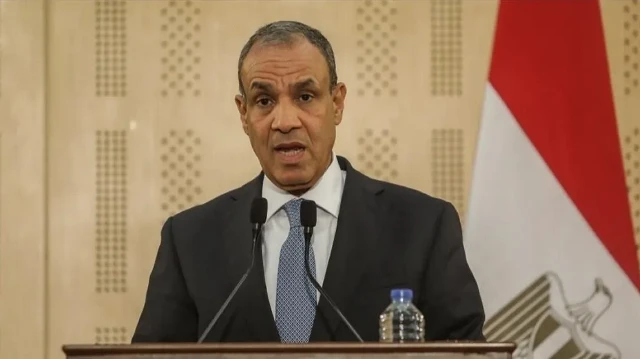
Egypt’s foreign minister discusses with US envoy efforts to secure ceasefire in Gaza
Egypt accused Israel on Saturday of deliberately creating famine in Gaza, describing calls for the so-called “voluntary” displacement of Palestinians from the enclave as “nonsense.”
Foreign Minister Badr Abdelatty said the situation in Gaza “is not a natural disaster but the result of Israeli policy.”
“Starvation is being used as a weapon of war,” he told a press conference in Cairo alongside Philippe Lazzarini, head of the UN agency for Palestinian refugees (UNRWA).
“If there is a manmade famine (in Gaza), it is to push residents out of their land. It is nonsense to say that this is voluntary displacement.”
Israeli officials, including Prime Minister Benjamin Netanyahu, have repeatedly called for what they call “voluntary migration” of Palestinians from Gaza, where a choking Israeli siege has pushed the territory’s population into famine.
Reiterating that Palestinian displacement is a “red line” for Cairo, Abdelatty said Egypt rejects any attempt to sideline the Palestinian cause and called on Israel to accept the plan put forward by US envoy Steve Witkoff, which Hamas agreed to last month. He blamed Israeli “obstruction and impossible conditions” for blocking progress toward a ceasefire.
Abdelatty said Egypt and its partners have developed a comprehensive Arab-Islamic plan for Gaza covering security arrangements, early recovery and reconstruction. The plan includes empowering and deploying Palestinian police forces inside the enclave.
Lazzarini, for his part, said a ceasefire is “the only way to end Gaza’s humanitarian catastrophe and secure the release of hostages.”
He confirmed that famine in northern Gaza is already a reality, calling it “entirely man-made.”
Lazzarini also warned of UNRWA’s worsening financial crisis, saying the refugee agency has been forced to cancel programs.
Abdelatty praised UNRWA’s role, stressing that “support for the agency is a legal and moral duty” and condemning Israeli attempts to undermine it.
Rafah crossingThe Egyptian foreign minister also held a phone call with Witkoff to discuss efforts aimed at securing a ceasefire in Gaza.
According to Egypt’s Foreign Ministry, the talks focused on “joint efforts to reach an agreement” based on the US envoy’s proposal.
Abdelatty stressed the importance of Israel engaging with the proposal to reduce tensions, allow humanitarian aid into the enclave, and secure the release of hostages and Palestinian prisoners.
Relations between Cairo and Tel Aviv have soured after Israel claimed Egypt was keeping Gaza’s Rafah crossing shut.
Abdelatty rejected the claim, saying Egypt has kept the crossing open “around the clock,” while “Israel is the one preventing the entry of aid.”
He said more than 6,000 trucks loaded with food and supplies are stranded on the Egyptian side, accusing Israel of deliberately holding them back “before the eyes of the international community.”
On Aug. 18, Hamas accepted a partial ceasefire and prisoner swap deal aligned with an earlier Witkoff plan once approved by Israel. Hamas has since signaled willingness for a broader agreement that includes an end to the war and Israel’s withdrawal from Gaza, but Prime Minister Benjamin Netanyahu has declined to approve the proposal.
The Israeli army has continued a brutal offensive on the Gaza Strip, killing more than 64,300 Palestinians since October 2023. The military campaign has devastated the enclave, which is facing famine.
Last November, the International Criminal Court issued arrest warrants for Israeli Prime Minister Benjamin Netanyahu and his former Defense Minister Yoav Gallant for war crimes and crimes against humanity in Gaza.Israel also faces a genocide case at the International Court of Justice for its war on the enclave.







